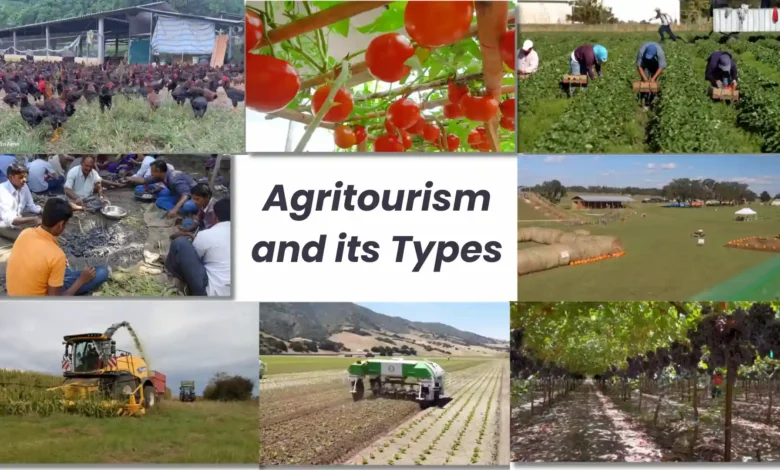
Agritourism and its Types | Purpose and Importance
Agritourism connects people to food production, rural life, and nature by combining agriculture and tourism. It involves events where guests visit farms and rural locations for fun and educational experiences.
Agricultural tourism combines farming with tourism, attracting visitors to farms, ranches, and other agricultural locations. Furthermore, this helps farms and ranches earn additional income as well as entertain and educate visitors. Learn about the types of agritourism, its importance, and its purpose.
Types of Agritourism
Farm Stays and Bed & Breakfasts
The guests help pick crops and feed animals on working farms. Also, they enjoy fresh produce and see farm life up close.
U-Pick Operations
Farmers open their fields and orchards to the public, allowing people to pick their own fruits, vegetables, and flowers. This hands-on activity is a fun way to learn about the origins of food and connect with nature.
Farm Tours and Demonstrations
Guided tours and demonstrations teach visitors about farming techniques, crop production, and animal care. Activities might include watching milking, shearing sheep, or learning about sustainable farming practices.
Agricultural Festivals and Fairs
Festivals celebrating harvests, specific crops, or agricultural heritage offer activities like hayrides, petting zoos, and local food tastings in a festive atmosphere.
Winery and Brewery Tours
Vineyards and breweries offer tours, tastings, and insights into the production of wines and craft beers, highlighting local ingredients and artisanal processes.
Educational Workshops and Classes
Farms host workshops on cheese-making, organic gardening, or cooking with farm-fresh ingredients, providing hands-on learning experiences.
Recreational Activities
Activities like horseback riding, fishing, hiking, and corn mazes add adventure and fun, attracting families and outdoor enthusiasts.
Importance of Agritourism
Economic Benefits
Agritourism gives farmers extra income, helping sustain their operations during tough economic times or when commodity prices fluctuate. It also boosts local economies by attracting tourists who spend on accommodations, food, and local products.
Education and Awareness
Agritourism bridges the gap between urban and rural communities. It teaches visitors about agriculture, the source of their food, and the importance of sustainable practices. This awareness leads to more informed consumer choices and support for local farmers.
Cultural Preservation
Agritourism helps preserve rural traditions, crafts, and agricultural heritage. By showcasing these elements, it fosters a deeper appreciation for the cultural and historical significance of farming communities.
Taking care of the environment
Engaging with sustainable farming practices through agritourism promotes environmental consciousness. Visitors learn about organic farming, conservation, and the impact of their food choices on the planet.
Community Building
Agritourism strengthens the social fabric of rural areas by fostering community pride and encouraging local collaboration. Events and activities bring people together, creating a sense of community and shared purpose.
Purpose of Agritourism
Education and Advocacy
Agritourism educates the public about agricultural practices, the challenges farmers face, and the importance of local food systems. This knowledge can inspire advocacy for policies supporting sustainable agriculture and local food networks.
Recreation and Relaxation
It offers recreational opportunities and a chance to unwind in natural surroundings, providing a peaceful retreat from urban life. This contributes to the physical and mental well-being of visitors.
Promotion of Sustainable Practices
By showcasing sustainable farming methods and their benefits, agritourism encourages visitors to adopt eco-friendly practices in their own lives and supports businesses that prioritize sustainability.
Supporting Local Economies
Agritourism supports local economies by attracting visitors who spend money on farm products, local crafts, and services. This economic activity helps sustain small farms and rural communities.
Enhancing Farm Viability
For farmers, agritourism provides a way to diversify income and enhance the financial viability of their operations. It reduces dependence on traditional agricultural markets.
Conclusion
Agricultural tourism boosts rural economies, provides farmers with extra income, and improves public awareness of agriculture. As a result, tourists are drawn to farms and ranches, promoting cultural exchange and fostering a sense of community between urban and rural communities. Local economies benefit from this industry because it generates jobs and stimulates consumer spending.
Moreover, agritourism significantly contributes to environmental conservation by encouraging sustainable practices and informing the public about the value of biodiversity and resource preservation. It also bolsters people’s mental and physical health by providing leisure opportunities and a peaceful refuge from the bustle of the city.




